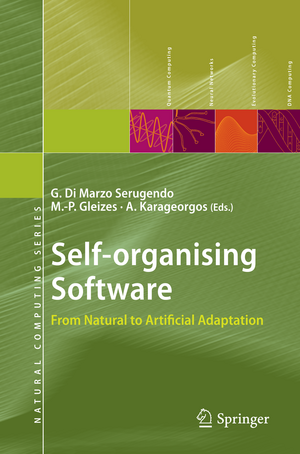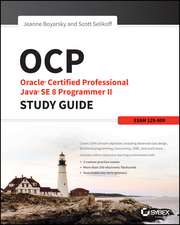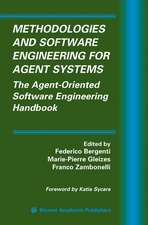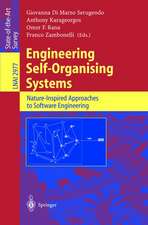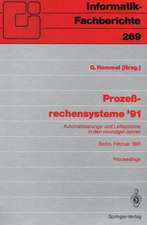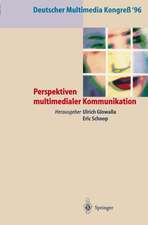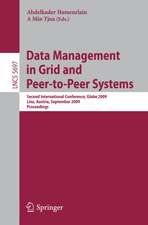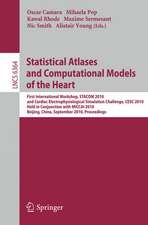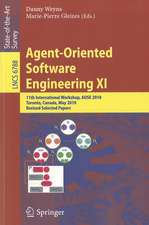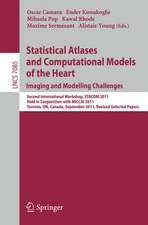Self-organising Software: From Natural to Artificial Adaptation: Natural Computing Series
Editat de Giovanna Di Marzo Serugendo, Marie-Pierre Gleizes, Anthony Karageorgosen Limba Engleză Hardback – 15 sep 2011
Self-organisation, self-regulation, self-repair and self-maintenance are promising conceptual approaches for dealing with complex distributed interactive software and information-handling systems. Self-organising applications dynamically change their functionality and structure without direct user intervention, responding to changes in requirements and the environment. This is the first book to offer an integrated view of self-organisation technologies applied to distributed systems, particularly focusing on multiagent systems.
The editors developed this integrated book with three aims: to explain self-organisation concepts and principles, using clear definitions and a strong theoretical background; to examine how self-organising behaviour can be modelled, analysed and systematically engineered into agent behaviour; and to assess the types of problems that can be solved using self-organising multiagent systems. The book comprises chapters covering all three dimensions, synthesising up-to-date research work and the latest technologies and applications. The book offers dedicated chapters on concepts such as self-organisation, emergence in natural systems, software agents, stigmergy, gossip, cooperation and immune systems. The book then explains how to engineer artificial self-organising software, in particular it examines methodologies and middleware infrastructures. Finally, the book presents diverse applications of self-organising software, such as constraint satisfaction, trust management, image recognition and networking.
The book will be of interest to researchers working on emergent phenomena and adaptive systems. It will also be suitable for use as a graduate textbook, with chapter summaries and exercises, and an accompanying website that includes teaching slides, exercise solutions and research project outlines.
Self-organisation, self-regulation, self-repair and self-maintenance are promising conceptual approaches for dealing with complex distributed interactive software and information-handling systems. Self-organising applications dynamically change their functionality and structure without direct user intervention, responding to changes in requirements and the environment. This is the first book to offer an integrated view of self-organisation technologies applied to distributed systems, particularly focusing on multiagent systems.
The editors developed this integrated book with three aims: to explain self-organisation concepts and principles, using clear definitions and a strong theoretical background; to examine how self-organising behaviour can be modelled, analysed and systematically engineered into agent behaviour; and to assess the types of problems that can be solved using self-organising multiagent systems. The book comprises chapters covering all three dimensions, synthesising up-to-date research work and the latest technologies and applications. The book offers dedicated chapters on concepts such as self-organisation, emergence in natural systems, software agents, stigmergy, gossip, cooperation and immune systems. The book then explains how to engineer artificial self-organising software, in particular it examines methodologies and middleware infrastructures. Finally, the book presents diverse applications of self-organising software, such as constraint satisfaction, trust management, image recognition and networking.
The book will be of interest to researchers working on emergent phenomena and adaptive systems. It will also be suitable for use as a graduate textbook, with chapter summaries and exercises, and an accompanying website that includes teaching slides, exercise solutions and research project outlines.
| Toate formatele și edițiile | Preț | Express |
|---|---|---|
| Paperback (1) | 654.55 lei 6-8 săpt. | |
| Springer Berlin, Heidelberg – 27 noi 2013 | 654.55 lei 6-8 săpt. | |
| Hardback (1) | 655.02 lei 6-8 săpt. | |
| Springer Berlin, Heidelberg – 15 sep 2011 | 655.02 lei 6-8 săpt. |
Din seria Natural Computing Series
- 20%
 Preț: 507.38 lei
Preț: 507.38 lei - 20%
 Preț: 305.91 lei
Preț: 305.91 lei - 20%
 Preț: 992.26 lei
Preț: 992.26 lei - 20%
 Preț: 617.14 lei
Preț: 617.14 lei - 20%
 Preț: 645.47 lei
Preț: 645.47 lei - 20%
 Preț: 642.65 lei
Preț: 642.65 lei - 20%
 Preț: 998.04 lei
Preț: 998.04 lei - 18%
 Preț: 963.60 lei
Preț: 963.60 lei - 20%
 Preț: 655.20 lei
Preț: 655.20 lei - 20%
 Preț: 615.70 lei
Preț: 615.70 lei - 20%
 Preț: 645.65 lei
Preț: 645.65 lei - 20%
 Preț: 640.19 lei
Preț: 640.19 lei -
 Preț: 384.70 lei
Preț: 384.70 lei - 20%
 Preț: 652.54 lei
Preț: 652.54 lei - 20%
 Preț: 649.28 lei
Preț: 649.28 lei - 20%
 Preț: 330.75 lei
Preț: 330.75 lei - 20%
 Preț: 328.09 lei
Preț: 328.09 lei -
 Preț: 389.70 lei
Preț: 389.70 lei - 20%
 Preț: 644.66 lei
Preț: 644.66 lei - 20%
 Preț: 333.88 lei
Preț: 333.88 lei - 20%
 Preț: 1299.31 lei
Preț: 1299.31 lei - 20%
 Preț: 528.47 lei
Preț: 528.47 lei - 20%
 Preț: 648.11 lei
Preț: 648.11 lei - 15%
 Preț: 639.90 lei
Preț: 639.90 lei - 20%
 Preț: 322.43 lei
Preț: 322.43 lei - 20%
 Preț: 657.83 lei
Preț: 657.83 lei - 20%
 Preț: 659.31 lei
Preț: 659.31 lei - 20%
 Preț: 997.56 lei
Preț: 997.56 lei - 20%
 Preț: 508.61 lei
Preț: 508.61 lei -
 Preț: 400.85 lei
Preț: 400.85 lei - 20%
 Preț: 653.38 lei
Preț: 653.38 lei - 20%
 Preț: 308.60 lei
Preț: 308.60 lei - 20%
 Preț: 654.05 lei
Preț: 654.05 lei - 15%
 Preț: 652.17 lei
Preț: 652.17 lei - 20%
 Preț: 336.54 lei
Preț: 336.54 lei - 20%
 Preț: 656.19 lei
Preț: 656.19 lei
Preț: 655.02 lei
Preț vechi: 818.78 lei
-20% Nou
Puncte Express: 983
Preț estimativ în valută:
125.35€ • 136.11$ • 105.30£
125.35€ • 136.11$ • 105.30£
Carte tipărită la comandă
Livrare economică 22 aprilie-06 mai
Preluare comenzi: 021 569.72.76
Specificații
ISBN-13: 9783642173479
ISBN-10: 3642173470
Pagini: 450
Ilustrații: XVIII, 462 p.
Dimensiuni: 155 x 235 x 33 mm
Greutate: 0.68 kg
Ediția:2011
Editura: Springer Berlin, Heidelberg
Colecția Springer
Seria Natural Computing Series
Locul publicării:Berlin, Heidelberg, Germany
ISBN-10: 3642173470
Pagini: 450
Ilustrații: XVIII, 462 p.
Dimensiuni: 155 x 235 x 33 mm
Greutate: 0.68 kg
Ediția:2011
Editura: Springer Berlin, Heidelberg
Colecția Springer
Seria Natural Computing Series
Locul publicării:Berlin, Heidelberg, Germany
Public țintă
ResearchCuprins
Introduction.- History and Definitions.- Self-organization and Emergence in Natural Systems.- Software Agents.- Stigmergy.- Gossip.- Tags.- Cooperation.- Immune Systems.- Holarchy.- Middleware Infrastructures.- Analysis and Simulation.- Adaptive Trust Management.- Dynamic Robots Coordination.- Security in Artificial Systems.- Image Recognition.- P2P Protocols.- Conclusion.- App. A, Solutions to Selected Exercises.
Notă biografică
The first editor is the Editor-in-Chief of the ACM Transactions on Autonomous Adaptive Systems, while the first and third editors have coedited related books.
Textul de pe ultima copertă
Self-organisation, self-regulation, self-repair and self-maintenance are promising conceptual approaches for dealing with complex distributed interactive software and information-handling systems. Self-organising applications dynamically change their functionality and structure without direct user intervention, responding to changes in requirements and the environment. This is the first book to offer an integrated view of self-organisation technologies applied to distributed systems, particularly focusing on multiagent systems.
The editors developed this integrated book with three aims: to explain self-organisation concepts and principles, using clear definitions and a strong theoretical background; to examine how self-organising behaviour can be modelled, analysed and systematically engineered into agent behaviour; and to assess the types of problems that can be solved using self-organising multiagent systems. The book comprises chapters covering all three dimensions, synthesising up-to-date research work and the latest technologies and applications. The book offers dedicated chapters on concepts such as self-organisation, emergence in natural systems, software agents, stigmergy, gossip, cooperation and immune systems. The book then explains how to engineer artificial self-organising software, in particular it examines methodologies and middleware infrastructures. Finally, the book presents diverse applications of self-organising software, such as constraint satisfaction, trust management, image recognition and networking.
The book will be of interest to researchers working on emergent phenomena and adaptive systems. It will also be suitable for use as a graduate textbook, with chapter summaries and exercises, and an accompanying website that includes teaching slides, exercise solutions and research project outlines.
The editors developed this integrated book with three aims: to explain self-organisation concepts and principles, using clear definitions and a strong theoretical background; to examine how self-organising behaviour can be modelled, analysed and systematically engineered into agent behaviour; and to assess the types of problems that can be solved using self-organising multiagent systems. The book comprises chapters covering all three dimensions, synthesising up-to-date research work and the latest technologies and applications. The book offers dedicated chapters on concepts such as self-organisation, emergence in natural systems, software agents, stigmergy, gossip, cooperation and immune systems. The book then explains how to engineer artificial self-organising software, in particular it examines methodologies and middleware infrastructures. Finally, the book presents diverse applications of self-organising software, such as constraint satisfaction, trust management, image recognition and networking.
The book will be of interest to researchers working on emergent phenomena and adaptive systems. It will also be suitable for use as a graduate textbook, with chapter summaries and exercises, and an accompanying website that includes teaching slides, exercise solutions and research project outlines.
Caracteristici
This is the first book to provide a comprehensive view of self-organised software Will be suitable for use as a graduate textbook, with chapter summaries and exercises Is supported by an accompanying website that includes teaching slides, exercise solutions and research project outlines Includes supplementary material: sn.pub/extras
